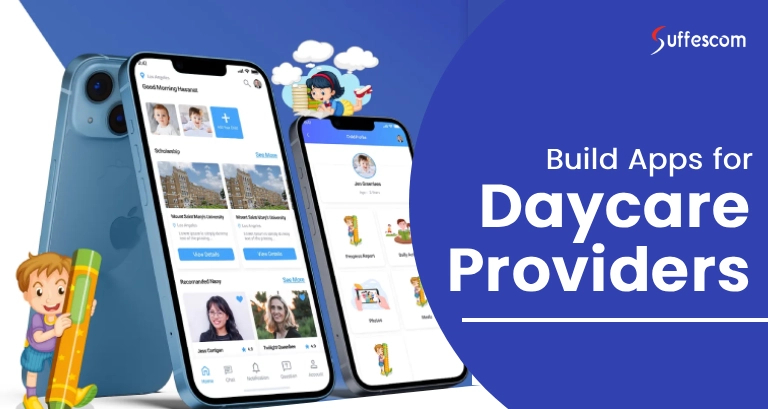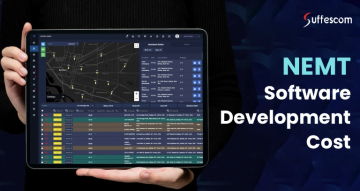Build Apps for Daycare Providers: Boost Your Center's Efficiency

Daycare centers are essential in almost every part of society, as these are the first steps in a child's developmental progress. Unfortunately, today, childcare centers are facing management overload, a significant communication gap with parents, and administrative inefficiencies.
All such problems hinder quality care and simultaneously emphasize the importance to build apps for daycare providers. Digital solutions can help centers streamline operations, enhance client engagement, and above all, ensure child safety.
The world is adopting these solutions as the daycare management software market is projected to exceed $10 billion by the end of 2025.
This blog aims to answer primary questions that arise in the minds of daycare center owners or administrators, parents, and tech startups.
Understanding Challenges of Daycare Operations: How Digital Solutions Resolve Them?
Running a business is not a cup of tea; multiple challenges confront you; you need to tackle them, and simultaneously, various opportunities emerge; you need to capitalize on them at the right time.
Just like any other business, whether small or large scale, daycare centers have to face multiple challenges. Let’s understand them.
Managing Enrollment and Attendance
The lesser or inconsistent the enrollment or attendance is, the more complex it will be for the owners or admin to run the daycare centers. On top of it, it makes it difficult to maintain the essential child-to-staff ratios and ensure safety.
What does it lead to?
- Increased potential risk of non-compliance with regulations
- An increased administrative workload, and
- Potential safety issues simultaneously
Disrupted enrollment or attendance is a serious concern for the daycare centers. Because it not only hinders accurate tracking but also impacts timely communication with parents.
Using the best apps for daycare providers can resolve this challenge by automating attendance tracking, enforcing ratios, and updating parents in real-time, reducing errors, and saving time.
Streamlined Communication with Parents
Parents are the primary target user group for a daycare center, and what good will it do for the center if it is unable to maintain streamlined communication with them? Many daycare centers often lose customers due to inefficient communication systems.
Unavailability of such systems makes clients feel disconnected or distrustful, leading to loss of potential leads and existing accounts.
Parents only trust a transparent daycare center, and daily communication is an essential pillar of transparency. Hence, it becomes necessary to invest in app development for daycare centers, automating daily reports, media, messaging, and announcements to keep parents informed and engaged.
Staff Management and Scheduling
Human resources ensures that your vision reaches the final consumer. The reputation and trust of a daycare center depend upon its staff. Daycare centers often struggle to schedule staff, manage absences, and maintain the required staff-to-child ratios.
Inefficient staff scheduling, distribution, and management are a bane to the daycare centers, leading to
- Under- or over-staffing
- Increased burnout, or
- Regulatory violations
The major reason behind these inefficiencies is not utilizing the potential of efficient and automated workforce management tools.
Regulatory Compliance and Policy Implementation
Maintaining regulatory compliance and implementing policies is equally essential to generating sales. Due to complex regulations on licensing and staff certifications, daycare providers often incur fines, forced closures, and damage to their goodwill.
Fulfilling complex and dynamic compliance regulations requires regular training and documentation. Hence, using the best apps for daycare providers makes sense, as they track compliance deadlines, automate documentation, and provide policy updates to staff.
Easy Financial Management
Financial management is the backbone of any business, and daycare centers are no different. Centers following the conventional approach often struggle with managing budgets, collecting fees on time, and practicing effective financial planning.
Poor financial management brings an inability to invest in improvements and increases the risk to operational sustainability.
Financial management is critical for business survival, and digital solutions play a crucial role in ensuring the same. These solutions improve cash flow and reduce administrative burden by
- Automating payments
- Streamlining online invoicing
- Assuring easy financial reporting
Managing Day-to-Day Administration
Daycare centers are often overloaded with daily tasks that take up most of their time. This leaves them with little room to plan for business growth, keeping the center running but without real progress.
Daycare centers juggle piles of paperwork, from attendance sheets, reports, health logs, to daily updates. There's little or no room for them to focus on what matters most: improving child care quality.
Complete apps for daycare providers and parents consolidate all administrative tasks into a single platform, which can help the center improve quality and save time.
Staff Recruitment and Retention
Without effective digital solutions, it really gets tough for the daycare centers to manage the talent pool. They experience high staff turnover and problems recruiting expert and qualified educators, leading to higher employee training costs.
Inadequate staff recruitment and retention greatly impact the child care quality and the daycare centers’ operational stability.
A daycare management app with workforce management features can help monitor staff's satisfaction and optimize staff scheduling to decrease burnout.
Security and Privacy Concerns
Data security is one of the prime concerns for every stakeholder involved with daycare centers. It becomes the owner or admin's responsibility to ensure the safety and privacy of children's data and avoid legal issues and loss of trust.
Why are there prevalent security and privacy concerns? The answer is the lack of sufficient security protocols and outdated IT systems.
Build Apps for Daycare Providers to Maximize Efficiency
Simplify daily tasks and enhance child care quality with tailored daycare apps.
How do the Best Apps for Daycare Providers Help Tackle Challenges?
Just using the basic version of apps for daycare providers and parents can help tackle and find solutions for the challenges as discussed above-
Attendance Tracking
The attendance tracking feature in a daycare management app establishes a systematic process of recording when each child or staff member enters and leaves the daycare. The following three are the significant components of this feature-
- Digital check-in/check-out with parent or staff authentication using QR code, PIN, or biometrics.
- Real-time dashboards that display current attendance by room/class.
- Automatic logging and historical records for compliance.
Tracking attendance quickly identifies absent children and automates attendance reports for accurate billing/compliance. This helps the owner or admin to reduce manual errors in headcounts and paperwork.
Using automated attendance tracking enables the owner/admin to keep control of staff management, scheduling, recruitment, and retention as:
- The app alerts when the child-educator ratio approaches the limits, allowing for timely allocation accordingly.
- The app helps reduce administrative workload, freeing up staff for care and engagement.
- The app transparently logs the shift timing, ensuring fair labor practices and easier payroll.
Parent Communication Tools
These tools create a system that allows the daycare centers and parents to exchange information, updates, and feedback in real-time. Such communication tools include messaging modules, multimedia sharing, digital newsletters, and automated notifications.
97% of U.S. adults now own a smartphone, and establishing an effective communication channel with parents has become significantly easier.
The following tasks become easier with a streamlined communication channel in place-
- Uploading daily reports, event reminders, or photos allows parents to receive instant notifications.
- Setting up two-way messaging for both parents and providers to chat securely.
- Establishing automatic language translation for easy communication with diverse families.
- Reducing paperwork with quick approvals using digital forms and e-signatures.
- Tracking communications using a central dashboard for both care experts and parents.
These are functionalities, but do they bring any visible benefits? An easy and seamless parent-daycare communication channel-
- Increases parents' engagement, thus improving satisfaction and trust.
- Saves staff time by automating routine communications and paperwork.
- Improves safety and transparency as parents are always informed about their child's day.
- Strengthens relationships and increases retention/enrollment by meeting modern parent expectations.
- Supports compliance by tracking communication and digital records.
Billing & Payments
Daycare centers often spend more than one-third of their day managing payments with manual operations. On the contrary, a billing software can cut short the task to just a few hours.
Here's how billing and payment systems work in a daycare application-
- These systems automate invoicing for tuition and activity fees, sibling discounts, and co-payments.
- Schedule recurring payments for weekly, monthly, or custom periods, allowing parents to pay via the app.
- Tracks payment history, generates receipts, and handles missed or late payments with automated reminders.
- Integrates with accounting Software for accurate and standardized financial reporting.
Let's examine how these built-in billing and payment systems address the primary challenges faced by daycare centers.
Regulatory Compliance
Automatically generates and records tax receipts, supports accurate record-keeping, and maintains proper documentation for audits and reporting.
Financial Management
Offers real-time financial dashboards to forecast revenues and track outstanding balances and due payments.
Daily Operations
Automated billing and payment systems eliminate manual paperwork, streamline processing for multiple children/families, and automate essential reminders to parents.
Billing and payment systems offer various benefits, including saving administrative time, reducing errors, enabling transparency, increasing security, and improving convenience and satisfaction.
Child Progress Reports
A systematic infrastructure for child progress reports helps tackle the following three key challenges-
Enrollment and Attendance
- Child progress reports indirectly act as a sales pitch for the new parents. Reports showcase quality and personalized attention.
- Reports on attendance and progress improve daily tracking and ensure accurate records.
- Helps centers meet regulatory or curriculum objectives, making them more attractive to parents.
Streamlined Communication with Parents
- Child progress reports provide real-time updates on the child's developmental milestones, strengths, and areas for improvement.
- The reports help share multimedia and records easily, increasing transparency and parent engagement.
- Progress reports lay the foundation for communication between parents and educators.
Increasing Parent Satisfaction
- Parents get valuable information along with regular, easy-to-understand updates.
- Visually appealing documentation boosts confidence in a daycare center.
From building trust and setting personalized learning to delivering tailored learning and meeting regulatory compliance, child progress reports provide multiple benefits.
Security & Privacy Settings
Security & privacy settings automate compliance documentation, ensuring that only authorized users access sensitive data. Moreover, compliance regulations such as GDPR, HIPAA, and COPPA build trust among parents.
The daycare owner or admin can implement and enforce data protection policies by creating audit trails, setting logins, and enabling detailed permission settings for staff.
Using a dedicated daycare management app allows for easy encryption, access control, and routine updates, reducing the risk of non-compliance fines or shutdowns.
Daycare centers can establish the following security parameters to address security and privacy concerns-
- End-to-end encryption to protect data from unauthorized parties
- Multi-factor authentication
- Live-streaming features
- Role-based access control
- Background screening and identity verification
Setting these security parameters helps daycare centers earn greater trust and loyalty, reduce security risks, streamline daycare operations, and improve overall efficiency.
The Power of Custom App Development for Daycare Centers
Custom app development can do wonders for your daycare business, from catering to a specific user base to increasing brand awareness. But first, understand what makes an app 'custom' for daycare.
A custom daycare management app-
- Built to fit a center's unique workflows, branding, and policies.
- Integrates a balanced mix of essential and specialized features.
- Scalable for specific group sizes, locations, languages, and curriculum requirements.
- Allows precise user roles such as payroll, marketing, or accounting.
- Adapts dynamically based on feedback from real users, including owners, staff, and parents.
Customization means different things for different stakeholders. For daycare owners/admins, customization ensures the app directly solves operational problems and aligns with business goals.
For parents, customization offers features that align with their expectations for communication, transparency, and convenience.
What Benefits Does Customization Offer?
Adapts to Unique Workflows: Customized application aligns with a center's exact operational needs, policy requirements, and branding. It also eliminates unnecessary features, streamlining processes for staff and parents.
Higher Parent Engagement and Satisfaction: Custom apps provide instant notifications, tailored updates, and multimedia sharing to enhance trust and transparency. Customization also fosters retention by meeting specific parent expectations.
Higher Efficiency and Productivity: Using customs apps automates enrollment, attendance, payroll, billing, and milestone tracking. It reduces manual errors and saves time for educators, enabling them to focus more on quality care.
Advanced Data Security and Privacy: A custom-built solution ensures robust data security and privacy, maintaining the confidentiality of clients' information.
Cost Efficiency: Tailored daycare application reduces the usage of different software. Combining the required tools in one provides constant improvement and lowers maintenance costs.
Choosing Between Readymade vs. Customized Solution
Readymade daycare applications are faster to launch, have low up-front cost, and are suitable for daycare centers with basic needs and budget limits. Whereas, the custom solutions are fit for unique needs, branding, growth, and competitive edge. Custom apps have a higher initial investment but better long-term ROI.
The following are the decision criteria to choose between readymade or custom daycare apps-
- List gaps in your daycare centers
- Assess and finalize your future needs
- Established security measures
- Requirement for constant support
- Ownership cost
The typical approach daycare centers take is to adopt a hybrid approach, i.e., starting with ready-made solutions and then upgrading or switching to custom ones.
Choose the Best Apps for Daycare Providers to Streamline Routines With Ease
Empower your daycare with the best digital solution, ensuring smoother daily routines.
Step-by-Step Guide: Build Apps for Daycare Providers
Let's understand the process for app development for daycare centers.
Step 1: Identifying Core Needs
The day care software development process starts with identifying the core needs associated with your daycare centers. Firstly, define what your daycare center truly needs from an app, including features, workflows, budget, compliance, and communication.
How do you identify the core needs? Gather input from staff, parents, and administrators, audit current problems, and prioritize requirements. Identifying core needs ensures the app solves real problems and maximizes ROI.
Avoiding examination of core needs leads to inefficient apps that actually fail to solve the problem. Hence, ineffective requirement analysis results in wasted investment.
Points to Consider:
- Include all stakeholder voices
- Distinguish between 'needs' and 'wants' features
- Consider future scalability
Step 2: Choosing the Right Development Partner
Choosing a development partner either makes or breaks the application. It is the most crucial step to build the best apps for daycare providers. Hence, find an experienced and trustworthy app developer with expertise in the childcare industry and robust support.
Check portfolios, references, or review case studies to find an ideal development partner that understands your requirements and vision. Choosing the right development partner-
- Minimizes risks of technical delays
- Reduces overruns or quality issues
- Developing daycare apps that match your needs
Look for post-launch support plans, security certifications, and flexibility. Choosing an inefficient development partner can lead to project failure, incur additional expenses, and result in stressful rework.
Step 3: Design and User Experience Priorities
UI/UX design elements play a crucial role in retaining the existing customer base and attracting potential new ones. An app design must be simple, intuitive, and have accessible features for both staff and parents.
To create a visually appealing design, collaborate on wireframes and prototypes, run usability testing with actual users, and gather feedback.
A good app design boosts adoption and satisfaction, while a poor one causes confusion and reduces retention.
Points to Consider:
- Responsive design for phones/tablets
- ADA-compliant design
- Age-appropriate colors and icons for children-centric sections
Step 4: Testing & Iteration
Rigorously test the app for bugs, security flaws, and workflow glitches. After collecting the feedback from testing, iterate and refine features accordingly. Conduct beta releases, gather input, use analytics, and fix issues as they appear.
Testing helps improve performance, reliability, and user satisfaction. Incomplete testing results in operational disruptions, security breaches, or frustrated staff/parents, mainly due to glitches or missing features.
For best results, test in real center environments; include all user groups; plan for multiple test cycles.
Step 5: Launch & Ongoing Improvement
Train staff, monitor data, and prioritize regular feature upgrades to roll out the app, track usage, collect user feedback, and update it regularly.
Ongoing support helps maintain app relevance, boosts retention, and quickly adapts to evolving needs and regulations. While practicing this step, evaluate clear release plans, measure the impact, and schedule staff check-ins for feedback.
The full cycle software development process concludes with continuously improving the daycare application.
Best Apps for Daycare Providers
Brightwheel: A complete platform to automate billing, improve parent-daycare communication, manage the admissions process, build curriculum, and practice real-time reporting.
Procare: Trusted by more than 40,000 centers, Procare offers robust compliance, digital payments, end-to-end administrative automation, and comprehensive family engagement tools.
HiMama (now Lillio): Streamlines daily documentation, billing, and parent communication with an intuitive interface, aligns curriculum to state standards for effective learning.
Tadpoles: Tadpoles focuses on improving school-home connections with seamless communication, multimedia learning, daily reports, and easy activity tracking for both parents and teachers.
Storypark: Empowers educators and families to collaboratively document and support children's learning, offering visually appealing, multi-modal storytelling tools with AI-powered features.
Famly: Automates admin tasks like invoicing, staff ratios, and reporting, offers secure real-time parent communications, all combined in a single intuitive interface.
Klassly: Combines real-time private messaging, video conferencing, and post-translation in 120+ languages. Klassly offers the most seamless multimedia sharing, messaging, and video conferencing experience.
KidKare: Assures USDA CACFP compliance, automates meal tracking and claims, and enables child care providers to easily manage food programs and administrative tasks from any device.
MyKidReports: A cloud-based, child care platform that boosts enrollment, automates billing, enhances parent communication, and centralizes attendance and reporting, supporting both single and multi-center management.
Putting It All Together!
Building apps for daycare providers is now essential for centers to grow, stay compliant, and deliver high-quality care. Digital solutions consolidate everything in one place, from attendance, staff scheduling, and parent updates to billing, compliance, and security.
Custom daycare apps add more value by setting unique workflows, enhancing transparency, increasing parent satisfaction, and ensuring data security. Whether you choose a ready-made app or invest in a customized solution, the goal remains the same:
Reduce manual work, enhance efficiency, and foster a safe and trustworthy environment for children.
By following a step-by-step approach, understanding your needs, choosing the right partner, prioritizing design, testing thoroughly, and committing to ongoing improvement, you can build an app that truly transforms your daycare operations and sets your center up for long-term success.
Frequently Asked Questions
1. How to get parents involved in daycare?
To get parents' maximum involvement in daycare, set a clear and transparent communication channel to make them feel more engaged and valued. Various renowned daycare apps for parents, like Procare, have every essential provision to engage parents.
2. How much does it cost to build the best apps for daycare providers?
Daycare management software costs between $10,000 and $25,000, depending upon the business requirements, number and complexity of the features, UI/UX design, cross or native platform development, and other essential factors.
3. What is the best childcare management software?
There are various apps for daycare providers and parents available in the market. The choice for the best among all depends on the user, their requirements, the features they want, and their scale of operations, among other factors.
4. How to choose the best daycare app development company?
First of all, check the app development for daycare centers reviews, review the portfolios, understand the pricing, and get clear information on the daycare app development process.
5. How to build apps for daycare providers free of bugs and errors?
There is a standardized process for developing applications for daycare centers that automates and improves every essential process. It starts with requirement analysis, creating a development strategy, designing the user interface and experience, developing the app infrastructure, testing, and ends at market launch.







